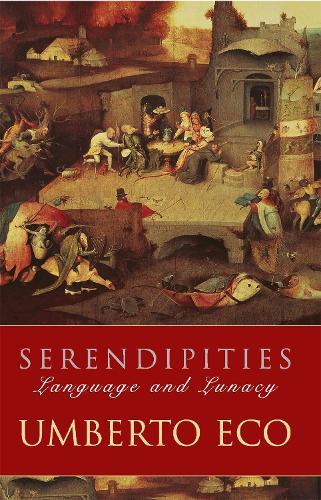Overview
In this work, Umberto Eco demonstrates how myths and lunacies can produce historical developments of no small significance. In Eco's words, ""even errors can produce interesting side effects"". This book shows how: believers in a flat earth helped Columbus accidentally discover America; how the medieval myth of Prester John, the Christian king in Asia, assisted the European drive eastward; and how the myth of the Rosicrucians affected the Masons, leading in turn to the widespread belief in a Jewish masonic plot to dominate the world and other forms of paranoid anti-Semitism in the 19th and 20th centuries.
Full Product Details
Author: Prof Umberto Eco ,
William Weaver
Publisher: Orion Publishing Co
Imprint: Weidenfeld & Nicolson
Dimensions:
Width: 12.60cm
, Height: 1.80cm
, Length: 19.60cm
Weight: 0.160kg
ISBN: 9780753808788
ISBN 10: 0753808781
Pages: 176
Publication Date: 02 May 2002
Audience:
General/trade
,
General
Format: Paperback
Publisher's Status: Active
Availability: To order

Stock availability from the supplier is unknown. We will order it for you and ship this item to you once it is received by us.
Reviews
"""Examines, with wit and elegance, some of the many cases in which a mistaken belief has led to a sound result . . . Delightful.""-The Atlantic Monthly ""Rich in historical anecdotes . . . Throughout, his treatments are informative, intellectually sophisticated, and thoroughly entertaining.""-Library Journal"
Italy's most celebrated public intellectual gathers five essays that focus (more or less) on how lunatic misunderstandings concerning the perfect language have led to new discoveries (sort of). Eco (The Name of the Rose, 1983, etc.; Semiotics/Univ. of Bologna) remains Italy's most successful and prolific writer. He is a novelist, cultural commentator, essayist, literary critic, and scholar of language. The present volume of essays is spun off his work on the historical search for the perfect language, i.e., the language that God gave Adam, the one that was lost in the catastrophe at the Tower of Babel. But the conceit with which he rather unsuccessfully attempts to unify the book is this: the search in the cases he explores always involves either outright errors or otherwise fictional inventions that have somehow led to positive discovery. After all, Columbus accidentally discovered the New World owing to miscalculations about the size of the earth. Eco sees similar situations in the history of language. For example, a 16th-century Jesuit, Father Athanasius Kircher, fancifully and elaborately interpreted ancient Egyptian hieroglyphics as the lost language of the Garden of Eden. Kircher was wildly wrong. Still, notwithstanding his eventual failure, he is the father of Egyptology. This and similar disappointingly general findings do not satisfyingly deliver on the promise that the errors serendipitously produce truth. But all is not lost. The meandering erudition of Eco's book is interesting enough in its own right. He speculates, for example, that Dante believed his own Italian vernacular, as distinct from official Latin, was in fact an echo of Adam's perfect language. And, he examines philosophical attempts by Leibniz and others to recreate a perfect language and Joseph de Maistre's combination of linguistic mysticism and reactionary politics. The genial Eco may have had the lay reader in mind when he wrote these essays (which were originally lectures), but his book of linguistic arcana is also of avowedly esoteric interest. (Kirkus Reviews)
In this collection of five lectures the author of The Name of the Rose takes us on a series of thought-provoking journeys down the byways of language and intellectual history. The theme of the volume is the great falsehoods or mistakes which changed the world. Thus Columbus discovered America while looking for something else; and a completely bogus letter of the 12th century, claiming that Christian people existed in the East, stimulated a huge expansion of Western civilization towards the Orient over the next 500 years. Eco also repeatedly returns to the quest to find the universal language said to have existed before the confusion of tongues at the Tower of Babel. Witty, erudite and encyclopedic. (Kirkus UK)
Examines, with wit and elegance, some of the many cases in which a mistaken belief has led to a sound result . . . Delightful. -The Atlantic Monthly <br> Rich in historical anecdotes . . . Throughout, his treatments are informative, intellectually sophisticated, and thoroughly entertaining. -Library Journal<br>
Author Information
Umberto Eco is Professor of Semiotics at the University of Bologna and one of the world's most famous, and admired, writers.




